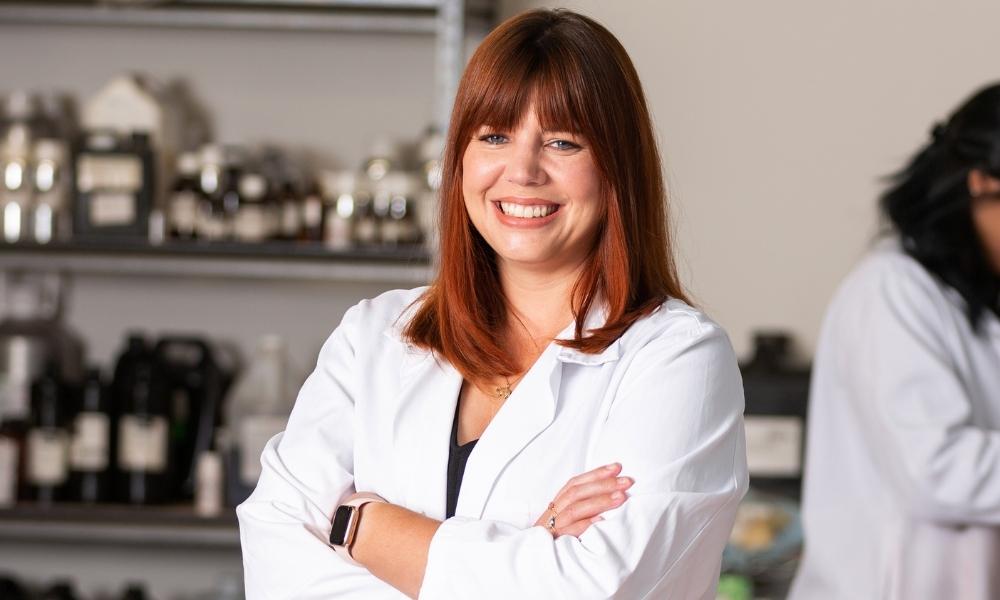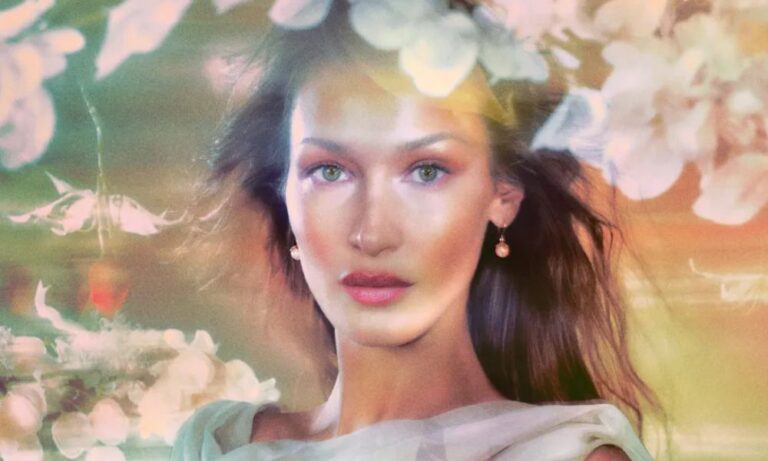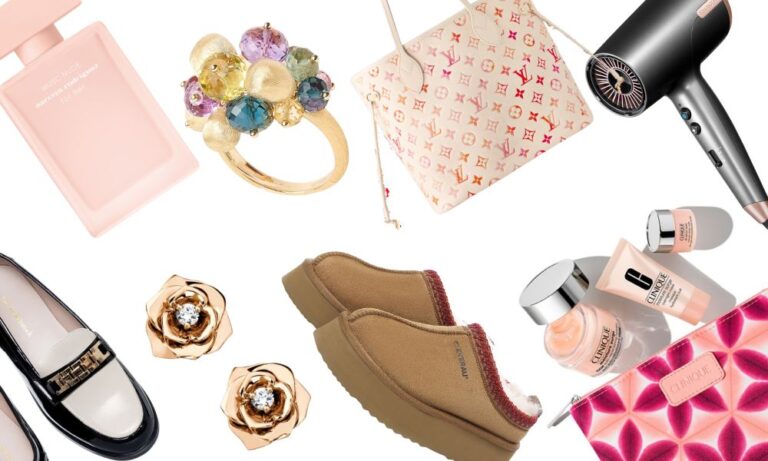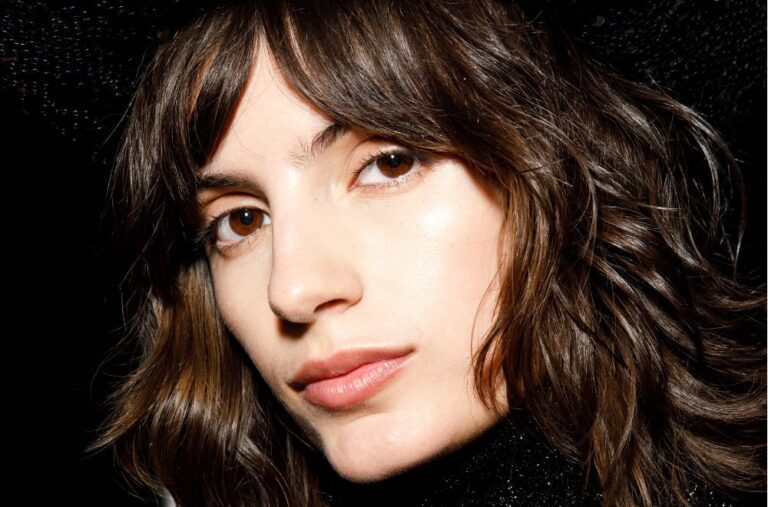Ethique founder Brianne West created her company 10 years ago, hoping to move the needle on beauty’s plastic waste problem. Since then, the Kiwi entrepreneur and biochemist has helped introduce the world to solid shampoo bars, bodycare and makeup with compostable packaging as well as concentrated homecare products.
Her zero-waste, zero-plastic range is now stocked in 6,000 retailers globally and the B-Corp brand has just celebrated the milestone of saving 23 million plastic bottles from entering landfill.
West has also just launched the Ethique Foundation, a charitable trust to support organisations and individuals addressing environmental and social issues.
We spoke to West on her success and future business and charitable goals still in her sights.
What are you surprised that people still don’t know about using solid products?
The majority of people don’t think solid beauty products work.
Gone are the days where bar equals soap, and I just don’t think people realise how far solid beauty products have come in the past few years. Say with shampoo bars, they really are salon-quality shampoo without the water and unnecessary plastic.
Our solid skincare products include skin super-ingredients like niacinamide and hyaluronic acid and are just as easy to use in your routine than any liquid product. Not to mention that they are worlds better for the environment than bottled products.
Switching to solid shampoo and conditioner could save 12 plastic bottles from ending up in landfill every year and 33 litres of water!
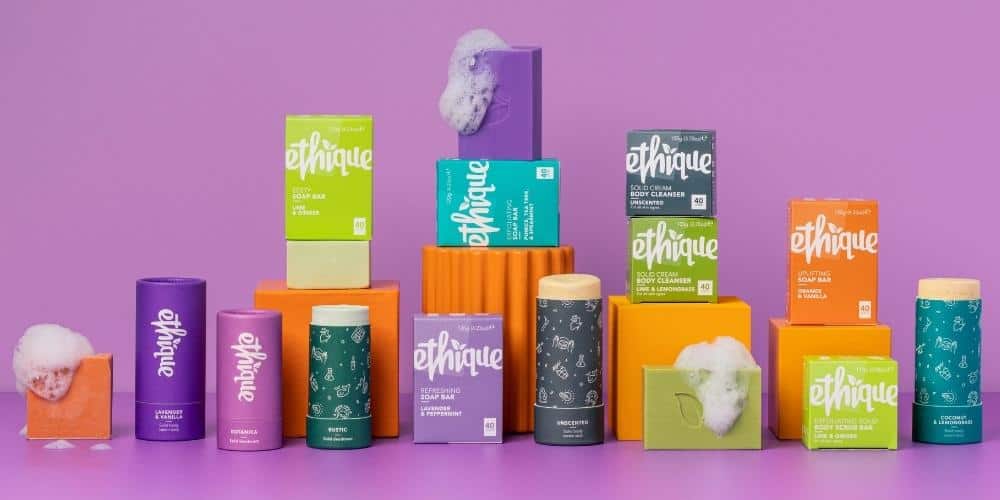
Ethique’s extensive range includes these body care products.
What’s the best way to dip your toe into solid beauty bar use?
Take it one step at a time. To some I would recommend starting with shampoo and conditioner – that seems to be a gateway bar for many people. There are so many options out there, which means you can cater to any hair type and still get great hair results. Or, some people seem more comfortable with a face-cleansing bar – Bliss Bar being the most luxurious creamy cleanser I’ve
ever tried. Following that, try out a solid face moisturiser, or a solid body butter as they are easier to use than you’d expect.
How does it feel wanting to move the industry forward but also seeing so many similar products popping up?
Fabulous! It’s a huge win for the environment, and I don’t consider we have any more competitors than we did before – we have always been competing with liquid shampoos. We want to convert millions of people from liquids to bars, not move people from bar to bar brand.
When I started Ethique you’d be lucky to see a solid shampoo ever; now they’re on shelves around the world, and that is the sign of a revolution.
What I do find annoying, though, is the number of brands making plastic-free products like shampoo bars without considering anything else whatsoever. What a missed opportunity to do something properly, and use business as a force for good. The vast majority of shampoo bars contain palm oil (which is associated with huge environmental damage and horrifying working practices), tend to be produced by workers paid below the living wage, contain animal by-products, and have opaque supply chains.
This particularly tends to be the case with big global brands, who have been very quick to bring solid options to market in response to consumer demand, but surprisingly slow to address sources of environmental damage in their operations. Nevertheless, I do understand how difficult it can be to effect change in a large organisation.
What was the inspiration to extend your focus from a product-based business to committing to charity?
Charitable donations and investment in regenerative initiatives have always been a part of the company DNA and the Ethique Foundation is simply the logical next step.
Creating change for people and planet through using ethical business practices is our fundamental mission and we are so proud to have been able to work alongside so many wonderful organisations in environmental protection, reforestation, habitat preservation and animal welfare.
We’ve always given 20 per cent of profit – or 2 per cent of sales, whichever is greater in a given year – to charity. I remember being told by many how stupid that was for a start-up. And granted, start-ups aren’t renowned for having a lot of money, but it’s such an integral part of the brand it’s helped build brand equity, trust and loyalty with our customers.
We founded the Ethique Foundation to take the next step in formalising our commitment to supporting aligned organisations. In the past nine years we have donated over $2m to organisations globally and our goal is to reach $10m by 2025.
What is the Ethique Fellowship?
The Ethique Fellowship is a year-long program in which we will support five women across the globe who are working to creative genuine change for the planet, its people, and the environment. Through mentoring and financial support, we will amplify some incredible voices who are working on game-changing solutions through their organisations. Our support for each recipient will be
carefully tailored to their specific needs but will include financial support, mentoring and support to the value of $100,000.
What are your personal favourite products to use day-to-day?
Depends on the day, because new stuff always is my favourite new child – for at least a short time!
Pinkalicious is my favourite shampoo, we released this as a limited-edition bar to celebrate our 5th birthday but due to its popularity brought it back as a regular. I have a thing for pink, but also pink grapefruit and vanilla is probably the best smell combo in the world.
I adore our new cream body sticks– they are super hydrating and grease free.
The shade Poppy in our new lipstick range is the best shade in the world. I’m only slightly biased.

Ethique’s hair care range caters to a variety of hair types.
You started with a hair product, and have a surprising number of options now. How do you ensure everyone’s hair type is met with an effective solution?
It’s always been an important goal of ours to ensure we were catering to as many people as possible as we grew as a business. Our range spans options for dry, damaged, balanced and oily hair types, and people with touchy scalps.
When we launched our entirely solid curl care range for people with waves, curls and coils last year, it shot to the top of our bestseller list worldwide and has stayed in the top five ever since. That just goes to show the value of formulating shampoo bars to a really high standard for each hair type – rather than having one base formula and tweaking it.
The development process is pretty simple in theory, but it can take a while just to ensure products meet all of our strict criteria. Every time a customer suggests a product to us – be it by social media, to our customer service team, wherever – we note it down. Often ideas are things we already have in development but looking at the themes that come up repeatedly help us understand where the most urgent gaps are.
We spend a lot of time in our R&D lab in Ōtautahi Christchurch, tweaking formulas and testing on our (willing!) team members. Our products have to perform just as well as, if not better than, the liquid equivalent or they go straight back to the lab until they do. And the team are pretty harsh!
Throughout this period, my R&D team and I ensure every ingredient meets our strict criteria as well. All our bars are vegan and cruelty-free, but they’re also palm-oil free and we need to scrutinise the whole supply chain to ensure no traces of palm.
We work directly with our producers wherever possible, which ensures they are paid a genuinely fair wage, have a source of income year-round and have our support to invest in growing through regenerative farming techniques.
This does mean that sourcing a new active ingredient requires a lot of work to ensure we’re happy with the supply chain and working standards. But it is an exciting opportunity to find and work with new producers every time we create a new product, and build a range around a hero ingredient (like moringa oil from Rwanda in our lip care products).
What are you most proud of about your business journey?
It sounds twee, but honestly, seeing the growth in skills and confidence in my team. Most of the team are young and some are fresh out of university. Seeing them go from graduate, to creating marketing strategy, talking at board tables with investors or taking a product from idea to execution really is the coolest feeling. We’ve hit loads of milestones, but the joy that comes with that fades. The pride in seeing people develop never diminishes.
I’m also very proud of the change in the industry at large – hence all the new shampoo bar launches. I think it’s very clear Ethique has had a large hand in that, and that is how we will make the biggest difference of all.
What are some goals you have left?
When I started the company, I said we would save one million plastic containers from landfill (then laughed nervously). In 2020 we hit 10 million bottles saved from landfill, today we’ve already saved 23 million. The next goal is to hit half a billion by 2030.


